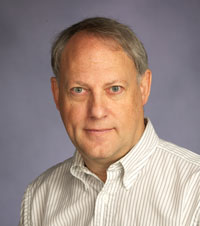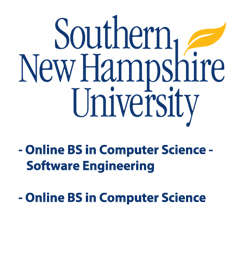
Computer Science at the University of Nevada, Las VegasUNLV’s Software-Engineering-Savvy Grads Can Make Fortunes in Las VegasBy Rick Docksai Young software-engineering professionals are making hefty sums of money in Las Vegas—and not by gambling. They earn their cash by working for the casinos, who hire them to operate the software that runs the slot machines, monitors inventory, and in general keeps business going 24-7. “Our students are stacked up (hired) immediately. They’re very popular with a lot of companies,” says Minor
“They do the programming and the graphics. It’s all run by computer chips,” says John Minor, Computer Science Associate Professor and Director, School of Computer Science at the University of Nevada-Las Vegas (UNLV). “And they develop new programs all the time.” Minor and his fellow computer-science professors train students in the skills that software-engineering jobs demand: creating and implementing algorithms, developing computer programs, and designing graphics, among others. When the students graduate—they can earn bachelor’s degrees, master’s degrees, or doctorates, all in computer science—they can find lucrative jobs at companies throughout every corner of this legendary casino city. 
John Minor, Computer Science Associate Professor and Director, School of Computer Science at the University of Nevada-Las Vegas (UNLV)
Those companies include plenty of others besides the gambling industry. Clothing retailer Zappos hires UNLV computer-science grads. NV Energy, the state electricity provider, also brings many of Minor’s students on board. Video-game companies are yet another source of employment. Westwood and Konami both have offices in the city, and both have numbers of UNLV computer-science graduates on their teams. “Our students are stacked up (hired) immediately. They’re very popular with a lot of companies,” says Minor. Beyond NevadaStudents find rewarding software-engineering careers outside Nevada, too. Minor has seen graduates take up graphics work at Pixar and other California-based animation studios. “Animation for Toy Story and all those other movies’ characters, monsters, and all those things, they need engineers to build them using computer graphics and a lot of special effects,” he says. Specializing in Software-EngineeringUndergraduates take a gamut of computer-science-related courses on the way to earning the bachelor’s degree. In their senior year, however, they are eligible for several courses geared specifically toward software engineering. Those include a two-semester course titled Software Product Design and Development. All seniors are required to take the first semester, but the second is an option. Those who enroll in this second-semester course will be tasked with organizing into teams and, as teams, designing computer-program models that they will present to the entire class at the semester’s end. “Each team does everything—design a model, implement tests, and deliver a product,” says Minor. In one semester, a student team developed a software program that a university administration could use to keep track of students’ registrations and registration cancellations for a given class. One UNLV summer-school class uses the program to this day, according to Minor. It’s not unusual for teams to come up with products that the university can use, adds Minor. He says that students often consult professors on ideas and then bring the idea to fruition with the professor’s occasional input. “They’ll go around and talk to professors, and ask if there is something useful that they can get done in one semester,” he says. Minor and his colleagues have no problem with the student teams seeking advice from other professors. The students are still the ones doing all the work. That outside professor is merely an advisor—like the clients for whom the students may one day develop software professionally. “The team interviews the professor, and then they go ahead and program the project up. So that’s their client, just like they would be out in the real world,” he says. Among the other software-engineering-relevant senior electives are some popular courses in graphics and animation. Students get to be creative and develop skills that many industries demand, not only in entertainment, but in scientific research, as well. “If you want to see a tornado or hurricane developing, you’d want a graphic model to see it,” says Minor. Students who particularly like the software-engineering angle can undertake more software-engineering-specific training in the master’s-degree program. It’s much more research-intensive than the undergraduate level. But it, too, entails building software. Like most master’s degrees in most schools, studentsare required to complete a project or thesis. Nevada ranked third in growth for technical and engineering jobs - United States Chamber of Commerce, 2011
“They can work with software apps, but normally it’s researching something that hasn’t been done before,” says Minor. This semester, two graduate-student projects are creating simulation models that electricity grids could use to control electricity fluctuations and to measure how various factors might affect electricity demand. Another project is creating an integrated data system for assessing photovoltaic solar-energy units’ performance, and yet another is designing a process-oriented programming language for “parallel programming” (a programming mode that is faster than conventional programming). High-Tech Computer Labs at UNLVUndergraduate and graduate students have an array of computer labs on campus at which they can work on their projects. There is a Computer Science Lab for all students, and two specialized labs: the Image Processing, Computer Graphics, Intelligent Systems Lab (ICIS) and the Operating Systems Lab. The Computer Science Lab is a basic lab. On its machines, students find all the basic programs that would be featured on most personal laptops or desktops. The ICIS, by comparison, is a work station for those upper-level classes in which students are working on hardware, software, and graphics projects. Their work requires a lot more processing time, as well as the liberty of permanently altering the computers’ software programs—something clearly out of the question in any regular campus computer lab. “They have a special area that they can play with the systems, destroy them, whatever they’re doing,” says Minor. Bright Future for Computer-Science GraduatesNevada benefitted over the last decade from an influx of businesses that moved into the state from neighboring states. Its private sector is still going strong, and that means an abundance of opportunities for software-engineering-savvy graduates to find work. Just ask the U.S. Chamber of Commerce, who ranked Nevada third in the country last year for growth of technical and engineering jobs. UNLV’s computer-science graduates, with the thorough training that their school gives them in software-engineering-relevant skills, are clearly in a great place at a great time. |

